- Application process for Germany VISA
- Germany Travel Health Insurance
- Passport Requirements
- Visa Photo Requirements
- Germany Visa Fees
- Do I need a Visa for short stays in Germany?
- How to Get Flight Itinerary and Hotel Booking for Visa Application
- Germany Airport Transit Visa
- Germany Business VISA
- Guest Scientist VISA
- Germany Job Seeker Visa
- Medical Treatment VISA
- Tourist & Visitor Visa
- Trade Fair & Exhibitions VISA
- Training or Internship VISA
- Study Visa for Germany
- Working (Employment) VISA
- German Pronunciation
- German Volabulary
- Requirements
- Health Insurance
- Trend & Living
- Free Assessment Form
- Privacy Policy

German Essays on My Family: Meine Familie

Learning or Practising German Language? or your tutor asked you to write about your family, or you can say you need to write an essay on My family (Meine Familie) but you have no idea how to do that and where to start?
Well, In this blog post, I have shared some Easy Essays on My Family (Meine Familie) . All the best and keep learning.
Before Start, First we need to discuss some vocabulary related to Family.
The following list includes most of the members of your family tree. Get familiar with these words so you can recognize them:
Read Also: Easy German Essays for Beginners: 8 Examples to Practice Your Language Skills
- der Bruder (dêr brooh -der) ( brother )
- der Cousin (dêr kooh -zen) ( male cousin )
- die Cousine (dee kooh- zeen -e) ( female cousin )
- die Eltern (dee êl -tern) ( parents )
- die Frau (dee frou) ( woman/wife )
- die Geschwister (dee ge- shvis -ter) ( siblings )
- die Großeltern (dee grohs -êl-tern) ( grandparents )
- die Großmutter (dee grohs -moot-er) ( grandmother )
- der Großvater (dêr grohs -fah-ter) ( grandfather )
- der Junge (dêr yoong -e) ( boy )
- die Kinder (dee kin -der) ( children, kids )
- das Mädchen (dâs maid -Hên) ( girl )
- der Mann (dêr mân) ( man/husband )
- die Mutter (dee moot -er) ( mother )
- der Onkel (dêr on -kel) ( uncle )
- die Schwester (dee shvês -ter) ( sister )
- der Sohn (dêr zohn) ( son )
- die Tante (dee tân -te) ( aunt )
- die Tochter (dee toH -ter) ( daughter )
- der Vater (dêr fah -ter) ( father )
Use the following words for the in-laws:
- der Schwager (dêr shvah -ger) ( brother-in-law )
- die Schwägerin (dee shvai -ger-in) ( sister-in-law )
- die Schwiegereltern (dee shvee -ger-êl-tern) ( parents-in-law )
- die Schwiegermutter (dee shvee -ger-moot-er) ( mother-in-law )
- der Schwiegersohn (dêr shvee -ger-zohn) ( son-in-law )
- die Schwiegertochter (dee shvee -ger-toH-ter) ( daughter-in-law )
- der Schwiegervater (dêr shvee -ger-fah-ter) ( father-in-law )
To express the term step-, you use the prefix Stief- with the name of the relative, like in this example: Stiefbruder ( steef- brooh-der) ( step-brother ). The term for a half relative uses the prefix Halb- , so half-sister looks like this: Halbschwester ( hâlp- shvês-ter).
German-speaking children use the following terms to talk about their parents and grandparents:
- die Mama (dee mâ -mâ) ( mom )
- die Mutti (dee moot -ee) ( mommy )
- die Oma (dee oh -mâ) ( grandma )
- der Opa (der oh -pâ) ( grandpa )
- der Papa (dêr pâ -pâ) ( dad )
- der Vati (dêr fâ -tee) ( daddy )
When directly addressing their elders, children leave out the articles dee (dee) ( the ) and der (dêr) ( the ). For example, Mama! Komm her! ( mâ -mâ!! kom hêr!) ( Mom! Come here! )
Read our Complete Vocabulary: Talking about – The Family – in German
Essay One: The Average Family
Meine Familie ist eine kleine Kernfamilie, die zu einer bürgerlichen Familie gehört. Meine Familie besteht aus vier Mitgliedern, einem Vater, einer Mutter, mir und einer kleinen Schwester. Wie andere indische Familien sind wir keine große Familie. Wir leben in Berlin, aber meine Großeltern leben auf dem Land. Zusammen mit meinen Großeltern wird meine Familie eine kleine Familie. Meine Familie ist eine vollständige, positive und glückliche Familie, die mir und meiner Schwester viel Liebe, Wärme und Sicherheit schenkt. Ich fühle mich in meiner Familie so glücklich, dass es auf mich aufpasst und alle meine Bedürfnisse erfüllt. Eine glückliche Familie bietet ihren Mitgliedern die folgenden Vorteile.
Here is what the text is about (this is not a 1-to-1 translation!)
My family is a small nuclear family that belongs to a middle-class family. My family consists of four members, a father, a mother, me and a little sister. Like other Indian families, we are not a big family. We live in Berlin, Germany, but my grandparents live in the countryside. Together with my grandparents, my family becomes a little family together. My family is a complete, positive and happy family, giving me and my sister a lot of love, warmth and security. I feel so happy in my family that it takes care of me and meets all my needs. A happy family offers the following benefits to its members.
Essay Two: The Average Family
If you live with your Mum, Dad, and with your brother or sister. Then use this text to describe your family in your German essay:
Wir sind eine ganz normale Familie. Ich wohne zusammen mit meinen Eltern, meiner kleinen Schwester Lisa und unserer Katze Mick. Meine Großeltern wohnen im gleichen Dorf wie wir. Oma Francis arbeitet noch. Sie ist Krankenschwester. Die Anderen sind schon in Rente. Oma Lydia nimmt sich viel Zeit für mich und geht häufig mit mir Kleider oder Schuhe kaufen. Leider will meine kleine Schwester dann auch immer mit. Mein Vater arbeitet bei einer Bank und fährt am Wochenende gern mit seinem Motorrad. Das findet meine Mutter nicht so gut, da sie meint, dass Motorradfahren so gefährlich ist. Sie sagt, dass ich und meine Schwester auf keinen Fall mitfahren dürfen. Mein Vater versteht das nicht, aber er will sich auch nicht streiten. Nächstes Jahr wollen wir in ein größeres Haus ziehen, weil meine Eltern noch ein Baby bekommen. Ich hoffe, dass wir nicht zu weit weg ziehen, da alle meine Freunde hier in der Nähe wohnen. Meine Tante Clara, die Schwester meiner Mutter, wohnt sogar genau gegenüber. Meine Cousine Barbara kommt deshalb häufig zu Besuch.
We are a very normal family. I live with my parents, my little sister, and our cat Mick. My grandparents live in the same village where we live. Grandma Francis still works. She is a nurse. The others are already retired. Grandma Lydia spends a lot of time with me, and we often go shopping together to look for clothes or shoes. Unfortunately, my little sister wants to come with us as well. My father works in a bank and likes to ride his motorbike on the weekend. My mother does not like that because she thinks it is very dangerous. She says we are never allowed to ride with him on the bike. My father doesn’t understand why, but he doesn’t want to argue with her. Next year, we are going to move into a bigger house because my parents will have another baby. I hope we are not moving too far because all of my friends are here. My aunt Clara even lives opposite to us. Therefore, my cousin Barbara often visits us.
Example Three: A Big Family
If you have a big family, this example may help you with your German essay:
Meine Familie ist sehr groß. Ich habe zwei Schwestern, einen Bruder, drei Tanten, einen Onkel und sechs Cousins. Meine große Schwester hat lange blonde Haare und heißt Laura und eine kleine Schwester heißt Miranda und ist dunkelhaarig. Mein Bruder heißt Fred und trägt eine Brille. Ich verstehe mich gut mit meiner kleinen Schwester und meinem Bruder. Mit meiner großen Schwester streite ich mich oft um den Computer. Mein Vater arbeitet zwar viel, aber am Wochenende hilft er uns immer bei den Hausaufgaben. Meine Mutter backt gerne Torten. Ihre Schokotorten mag ich besonders gerne. In den Ferien besuchen wir häufig meine Großeltern, da sie leider so weit entfernt wohnen. Meine anderen Großeltern, die Eltern meiner Mutter wohnen eine Straße weiter. Das finde ich schön, da wir uns oft sehen können. Außerdem haben sie eine süße Perserkatze, mit der ich immer spiele. Wenn uns meine Cousins besuchen kommen, unternehmen wir meist etwas Besonderes. Letztes Wochenende waren wir alle zusammen im Zoo. Das war lustig, da mein Cousin Ben Angst vor Schlangen hatte. Ich mag meine Familie!
Now, the same story in English:
My family is very big. I have got two sisters, one brother, three aunts, one uncle, and six cousins. My older sister has long blond hair, and her name is Laura. My little sister is called Miranda and has dark hair. My brother’s name is Fred and wears glasses. I get along well with my little sister and my brother. But I argue a lot with my older sister about the computer. Although my father works a lot, he always helps us with homework on the weekend. My mother likes to bake cakes. I especially like her chocolate cake. During the holidays, we often visit my grandparents because they live so far from us. My other grandparents, the parents of my mother, live on the street next to ours. I like that because that way we can see each other a lot. In addition to that, they have a cute Persian cat I always play with. When my cousins visit us, we always do something special together. Last weekend, we went to the zoo together. That was fun because my cousin Ben was afraid of the snake. I like my family!
Read Also: Learn German Numbers (Deutsche Zählen) and Pronunciation 1 to 999999
Essay Four: A Small Family
If you are living with only one parent, check out this text:
Meine Familie ist sehr klein. Ich lebe zusammen mit meiner Mutter und meinem Bruder. Tanten oder Onkel habe ich nicht. Meinen Vater sehe ich nur in den Sommerferien, da er weit weg wohnt. Meine Oma wohnt gleich nebenan. Sie kūmmert sich nachmittags um mich und meinen Bruder, wenn meine Mutter arbeiten muss. Meine Oma ist schon in Rente. Sie hat frūher mal bei der Post gearbeitet. Mein Opa und meine anderen Großeltern sind leider schon gestorben. Mein Bruder heißt Patrick und ist sehr gut in der Schule. Er ist sehr groß und schlank und hat blonde Locken. Meine Freundin findet ihn sūß. Das verstehe ich gar nicht. Ich mag es aber nicht, wenn er laut Musik hört und es gerade meine Lieblingssendung im Fernsehen gibt. Dafūr geht er immer mit unserem Hund Gassi, so dass ich das nicht tun muss. Ich wūnschte, ich hätte noch eine Schwester, die mir helfen könnte, meine Haare zu frisieren, oder mit der ich die Kleider tauschen könnte. Ich hoffe nur, dass meine Mutter nicht noch mal heiratet.
In English:
My family is very small. I live with my mother and my brother. I have no aunts or uncles. I only see my father during the summer holiday because he lives far away. My grandma lives next door. She looks after me and my brother when my mother has to work. My grandma is already retired. She used to work at a post office. My grandpa and my other grandparents are already dead. My brother’s name is Patrick, and he is doing very well at school. He is very tall and slim and has curly blond hair. My friend thinks he is cute. I cannot understand that at all. But I do not like it when he listens to loud music when my favorite tv show is on. On the other hand, he always walks the dog so that I don’t need to do that. I wish I had a sister who would help me style my hair or who I could swap clothes with. I do hope that my mother is not going to marry again.
Read Also: Easy Sentences you need for Introduce yourself in German
Essay Five: Living with Grandparents
Do you live with your grandparents? Then check out this example if it suits you:
Ich wohne bei meinen Großeltern, da meine Eltern gestorben sind, als ich noch ein Baby war. Wir wohnen in einem großen Haus, und ich habe ein riesiges Zimmer mit meinem eigenen Balkon. Im Sommer mache ich dort immer meine Hausaufgaben. Meine Großeltern sind ganz lieb zu mir. Mein Opa hilft mir immer, mein Fahrrad zu reparieren und meine Oma lädt meine Freunde oft zum Essen ein. Ich habe auch noch einen Onkel, der manchmal am Wochenende vorbeikommt und Architekt ist. Momentan arbeitet er jedoch in Japan für drei Monate. Wir passen solange auf seinen Hund auf, und er hat mir versprochen, mir eine Überraschung aus Japan mitzubringen. Eine Frau hat mein Onkel nicht. Meine Oma sagt immer, er sei mit seiner Arbeit verheiratet. Dann gibt es noch Tante Miriam, die eigentlich keine richtige Tante ist, sondern die beste Freundin meiner Oma. Die beiden kennen sich aber schon so lange, dass sie inzwischen auch zur Familie gehört. Tante Miriam hat viele Enkelkinder und manchmal treffen wir uns alle zusammen im Park. Dann machen wir ein großes Picknick und haben ganz viel Spaß.
And here is what the text is about (Remember, this isn’t a 1-to-1 translation!):
I live with my grandparents because my parents died when I was a baby. We live in a big house, and I have a huge room with my own balcony. In the summertime, I do my homework there. My grandparents are very nice to me. My grandpa always helps me repair my bike, and my grandma often invites my friends for dinner. I also have an uncle who comes around for the weekend from time to time, and he is an architect. At the moment, he is working in Japan for three months, and we are looking after his dog. But he promised me to bring a surprise back from Japan. My uncle has no wife. My grandma always says he is married to his job. Then there is aunt Miriam who is not a real aunt actually but the best friend of my grandma. Since they have known each other for such a long time, she became a member of our family. Aunt Miriam has lots of grandchildren, and sometimes we all meet in the park. Then we have a great picnic and much fun!
If you have any doubt or have some suggestions for us, or even if we missed something to mention in My Family (Meine Familie), Let us know by writing in a comment box. Thanks for reading and sharing with your friends.
More articles
Navigating the german language: a comprehensive starter vocabulary, 150+ common german phrases to sound like a native speaker, top german language books for self-learners: a comprehensive review, leave a reply cancel reply.
Save my name, email, and website in this browser for the next time I comment.

Popular Category
- German Language 39
- Lifestyle 35
- Trend & Living 30
- Level A1 23
© Plan for Germany. All rights reserved.
How to Speak About the Family in German
- History & Culture
- Pronunciation & Conversation
Learning how to ask about someone's name or inquire about the family in German is a great way to get to know people. Even if you just want to learn to make small talk, these kinds of questions will come up in most conversations. It's important to remember that rules for addressing people in German tend to be stricter than in many other cultures, so learning the proper rules will help prevent you from being unintentionally rude. Below are some common questions and answers in German and English.
Die Familie • The Family Continued
YOU: du - Sie
As you study the vocabulary for this lesson, pay attention to the difference between asking a formal ( Sie ) and a familiar ( du / ihr ) question. German-speakers tend to be much more formal than English-speakers. While Americans, in particular, may use first names with people they have just met or only know casually, German-speakers do not.
When a German-speaker is asked his or her name, the reply will be the last or family name, not the first name. The more formal question, Wie ist Ihr Name? , as well as the standard Wie heißen Sie? , should be understood as "what is your LAST name?"
Naturally, within the family and among good friends, the familiar "you" pronouns du and ihr are used, and people are on a first-name basis. But when in doubt, you should always err on the side of being too formal, rather than too familiar.
For more about this important cultural difference, see this article: You and thou, Sie und du . The article includes a self-scoring quiz on the use of Sie und du .
Kleine Familien
Families in German-speaking countries tend to be small, with only one or two children (or no children). The birthrate in Austria, Germany, and Switzerland is lower than in many modern industrialized nations, with fewer births than deaths, i.e., less than zero population growth.
- Everything you need to Know About German Names
- How to Use German Personal Pronouns
- Beginner German: Hear and Learn Words for Family Members
- How to Address Someone in German Properly
- Learning German "Give and Take" - "Geben, Nehmen"
- German for Beginners: Occupations (Beruf)
- Top German Mistakes Made by Beginners
- German Verbs with Prepositions 1 - German Lesson
- Capitalization in German
- German for Beginners: Study Tips
- Formal and Informal German Greetings
- How to Say Thank You and You're Welcome in German
- Translating the Terms for "People" in German
- Doch ...and Other Tricky German Words
- Which Countries Speak German?
- Kinderreime - Nursery Rhymes in German and English
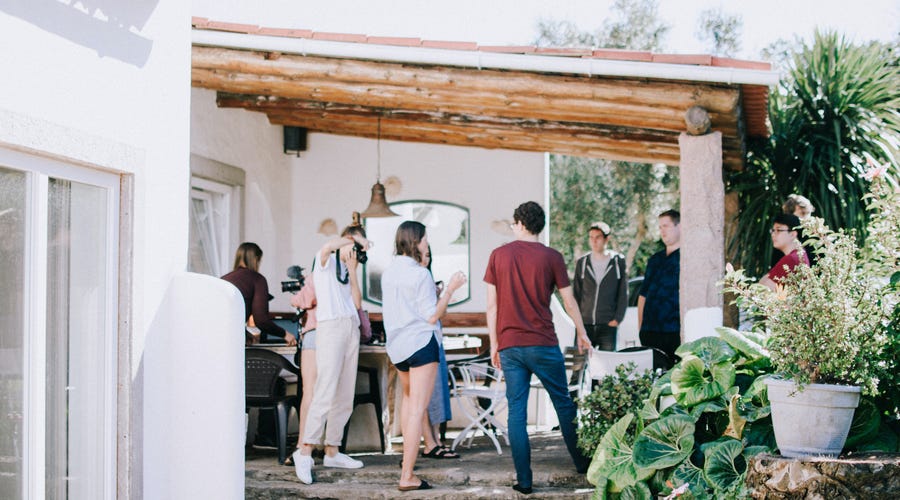
Learn to talk about your immediate, extended or chosen family in German

Marie Schmoll
More than 40 million Americans claim German ancestry , so many of them feel a little bit German even if they don’t actually live in a German-speaking country . If that’s you and you want to explain in German that your great-great-grandfather came from Germany, we’ve got you covered.
Learning how to refer to family members in German is a great way to get started on learning the German language . These are usually some of the very first words we learned to say in our mother tongue, too. That’s why they’re so simple and easy to pronounce. After all, little German babies are just as new to the language as you are. If they can manage to say “Mom” and “Dad” in German, so can you!
Family in German
The German word for family is “ Familie ” [faˈmiːli̯ə] and the plural is “ Familien ” [faˈmiːli̯ən]. Luckily it’s very similar to the English word: Fah-me-lee-eh(/en).
Slang words include “ deine Alten ” (your old ones) for someone’s parents, but this expression has a negative connotation. So unless you’re joking with a friend, be polite and stick to the official terms when you encounter the following scenarios:
- When meeting your German friend’s or partner’s family
- When making German smalltalk by asking someone how their family has been
- When meeting someone new and asking them basic questions about their family situation in German
Interested in your family history?
Immediate family members in german.
In German, the immediate family is called the “ Kernfamilie ” (nuclear or core family). Learning how to describe it is important for basic conversations. That’s why we’ll teach you crucial words like “Mother”, “Father”, “Brother”, “Sister”, “Daughter” and “Son” in German.
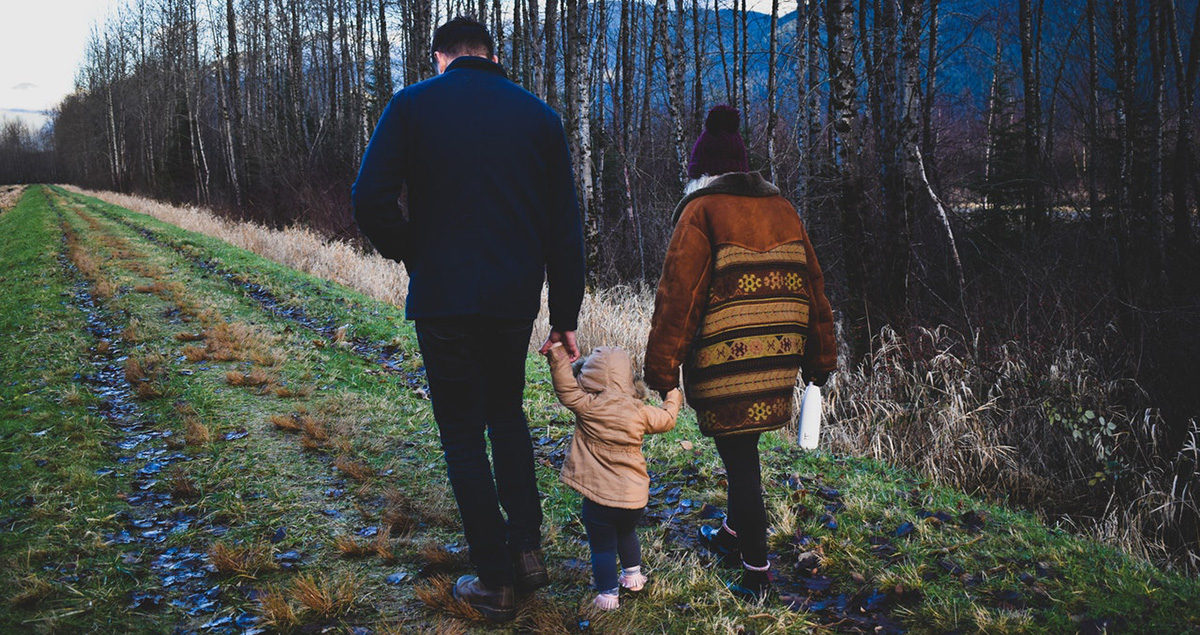
Extended family in German
Of course, most families are bigger than that. You might want to talk about your third cousins and your great great grandmother in German, too.

Family members by marriage - Step and in-laws
In Germany, like in America, too, the inlaws have a worse image than they deserve. Even though most people actually do get along with their in-laws, one German expression in particular reflects on the bad rep they get: “ Jemanden stiefmütterlich behandeln ” (to treat someone stepmotherly) means “to neglect or ignore someone”.
Other family-related terms in German
Family is based on so much more than biology. Here are some important terms you can use to explain and introduce your chosen family including adoption and marriage.
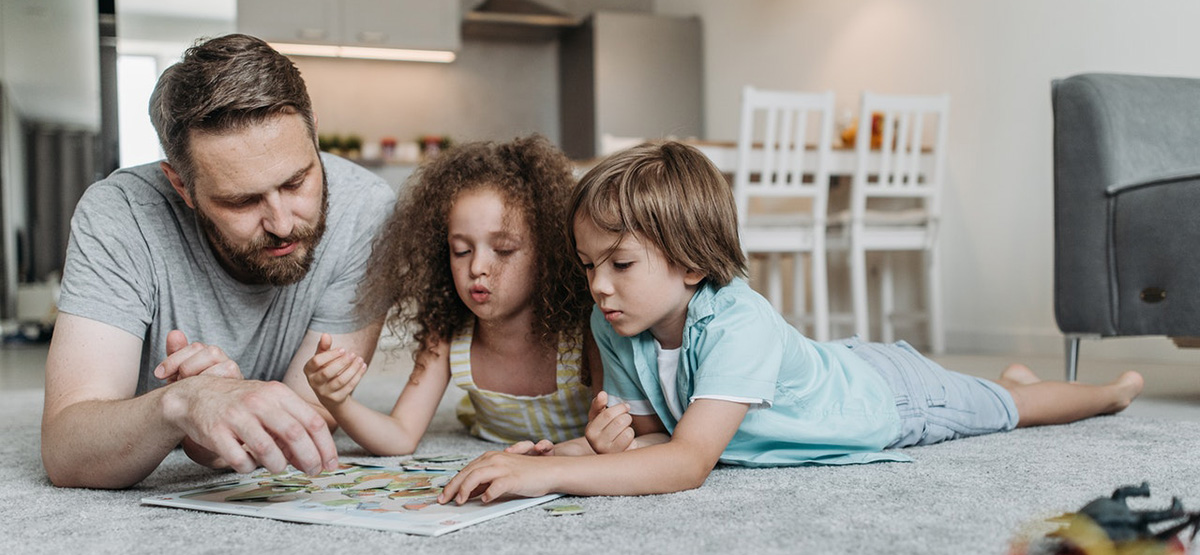
Talking about family in day to day situations
When you meet someone new, the first thing you probably want to know is their name . Next up, asking about their family is a great way to get to know them a little bit. You might want to ask if they have siblings or children and chat about your own family situation. So we’ll get you started with the basics.

Common conversation
- Question. Hast du Geschwister? (Do you have siblings?)
- Answer. Ja, ich habe einen großen Bruder und zwei kleine Schwestern. (Yes, I have a big brother and two little sisters.)
- Question. Hast du eine große Familie? (Do you have a big family?)
- Answer. Meine Familie besteht aus meinem Papa, meiner Stiefmama, meinem Bruder Bruno und meiner Katze Fräulein Miez . (My family consists of my dad, my stepmom, my brother Bruno and my cat Fräulein Miez).
- Question. Leben deine Eltern in der Nähe? (Do your parents live close by?)
- Answer. Nein, meine Eltern leben beide in Hamburg und ich lebe in Frankfurt. (No, my parents both live in Hamburg and I live in Frankfurt.)
An easy follow-up question is to ask their sibling’s age (or their puppy’s!). Remember pets absolutely are a part of the family. So don’t forget to incorporate them in the conversation. If you need help remembering what to call your pet in German, refer to our fun guides on animals and birds in German .
- Question. Ist deine Schwester älter oder jünger als du? (Is your sister older or younger than you?)
- Answer. Meine Schwester ist zwei Jahre jünger als ich . (My sister is two years younger than me.)
- Question. Wie alt sind deine Geschwister? (How old are your siblings?)
- Answer. Mein kleiner Bruder ist erst 10. Er geht noch zur Schule. Mein anderer Bruder studiert . (My little brother is only 10. He is still in school. My other brother is in college).
- Question. Wie alt sind deine Haustiere? (How old are your pets?)
- Answer. Mein Welpe ist erst ein Jahr alt, und mein Papagei ist zwei. (My puppy is only one year old, and my parrot is two.)
Describing your family in German
Do you have your mom’s eyes but your dad’s ears? There are many things you can say about your family, all of them great for smalltalk.
- Meine Mutter und mein Vater haben braune Augen, wie ich, aber meine Schwester hat blaue Augen. (My mother and father have brown eyes, like me, but my sister has blue eyes.)
- Ich hab die schwarzen Locken von meinem Vater. Meine Mutter hat rote Haare. (I got my curly black hair from my dad. My mother has red hair.)
- Ich bin mit einem Zwilling verheiratet. (I’m married to a twin.)
- Ich bin adoptiert. (I’m adopted.)
- Ich telefoniere einmal im Monat mit meinen Eltern. (I call my parents once a month.)
- Ich bin ein Katzenmensch, aber mein Freund ist eher ein Hundemensch . (I’m a cat person but my boyfriend is more of a dog person.)
Family-related German idioms
There are some fun idioms and sayings about family members in German. To raise someone literally means “to pull someone tall” ( großziehen ), which, as so many other quirky German expressions , creates a wonderful picture - like you could just grab the child by the head and the feet and start pulling them until they’re tall.
Also, having custody over a child is “the right to worry about them” ( Sorgerecht ) and the big toe is called the “Big uncle” in German ( Großer Onkel ).
Videos to learn how to talk about family in German
Kinderlieder - die hai-familie.
Have you always wanted to listen to the Baby Shark Song in German? Absolutely not?
Well, give it a try anyway because you know how effectively it will get stuck in your head. So when the lyrics are in German, you have no other choice but to learn them, including all the important family related words like “Mama”, “Papa”, “Oma” and “Opa”.

Cultural considerations when it comes to family in German
Marriages are at a record low in Germany - the lowest since World War I.
At the same time, birth rates have been increasing and people still form partnerships and live together. They just tend to not get married.
Maybe Germans are busy enough with the draining bureaucracies of everyday life and don’t want to make their lives even more complicated by adding the paperwork that comes with getting married to their list.
So they stay in committed relationships without getting married, which is how the beautifully long German word “ Lebensabschnittsgefährte ” came to be. A commonly used term, it literally translates to “life section companion” and refers to your current partner.
You may not want to use the word as a pet name, since it’s less romantic than “love of my life” and certainly longer than “bae” but if you think about it, it’s still a positive term.
It entails the idea that even if you may not spend your entire life with one person, they’re your companion for a specific time of your life and that’s very nice to have and acknowledge.
This is a very realistic, down-to-earth view on partnership - you might say a very German one.
Family structures hold societies together and they’re just as important in Germany as they are everywhere else. Yet, sometimes family matters can be a bit of a headache. So try to take an uncomplicated German approach to all things family:
If a relationship ever doesn’t work out, just thank your Lebensabschnittsgefährten that they were there for you during a special time in your life. Then remember that other mothers have pretty sons or daughters, too - and when it comes to raising kids, throw out all the parenting books. Just pull them until they’re tall enough to manage on their own.
Related Articles

June 08, 2022
How to ask someone's name & say what your name is in German

May 23, 2022
An actually fun guide to 9 different types of German pronouns

May 18, 2022
99 genuine ways to compliment and convey beautiful in German
1-866-423-7548, find out more.
Fill in the form below and we’ll contact you to discuss your learning options and answer any questions you may have.
I have read the Terms of Use and Privacy Policy
- Privacy Policy
- Terms Of Use
You are using an outdated browser. Please upgrade your browser or activate Google Chrome Frame to improve your experience.
Talk About Family in German with 41 Vocabulary Words
Have you ever noticed how often family comes up in conversation?
Whether you’re learning German for the first time or looking to expand your vocabulary , understanding how to talk about family is essential for everyday conversations.
Let’s explore how to talk about family in German, from your immediate to your extended family and beyond!
The Importance of Family in German Culture
How to say “family” in german, how to talk about family members in german, immediate family in german, extended family in german, sample sentences for talking about family, and one more thing....
Download: This blog post is available as a convenient and portable PDF that you can take anywhere. Click here to get a copy. (Download)
Family is highly valued in German culture. Germans often maintain strong ties with their immediate and extended families and there’s a strong sense of loyalty and commitment to your family.
The German social welfare system is also family-oriented, with policies that support families, especially those with children. This includes parental leave, childcare services and financial assistance. German parents are entitled to a whopping three years of parental leave … per child!
There’s also a strong emphasis on respecting and caring for elders in German families. Grandparents often play an active role in the lives of their grandchildren, providing wisdom and guidance. They’re generally well taken care of by the country when they need additional care later in life.
While elders are important, the typical German household consists of mother, father and children, with extended relatives and elders generally living on their own.
Special events and holidays are often celebrated at home with the family. These events bring family members together and are marked by traditions and rituals.
In fact, spending some down time with the fam is so important to German culture that it’s celebrated by Kaffee und Kuchen , an hour break from a work day to relax over coffee and cake with family (or friends/coworkers).
The word for “family” in German is Familie and the plural is Familien .
The word is pretty much synonymous, but just be sure to learn it as a singular word, not plural. Often in English, you’ll hear people say “My family are ” instead of “My family is. ” This doesn’t fly in German—so be sure to always conjugate whatever verb you’re using to the third person singular!
Here are a few examples:
Meine Familie ist groß. — My family is big.
Ich liebe meine Familie. — I love my family.
Wie geht es deiner Familie? — How is your family?
Seine Familie kommt aus Deutschland. — His family is from Germany.
Es gibt viele Familien in dieser Nachbarschaft. — There are many families in this neighborhood.
You just learned a lot of words! How do you actually put them to use? You can start by adapting the sentences below to suit whatever you need to say.
- Das ist meine Familie. — This is my family.
- Wir sind eine glückliche Familie. — We are a happy family.
- Ich habe einen Bruder und eine Schwester. — I have a brother and a sister.
- Meine Eltern leben in New York. — My parents live in New York.
- Ich verbringe gerne Zeit mit meinen Kindern. — I love spending time with my children.
- Wie geht es deiner Schwester? — How is your sister?
- Familie ist das Wichtigste im Leben. — Family is the most important thing in life.
- Meine Großeltern wohnen in einem kleinen Dorf. — My grandparents live in a small village.
- Ich habe viele Cousins und Cousinen. — I have many cousins.
- Wie viele Geschwister hast du? — How many siblings do you have?
- Erzähl mir mehr von deiner Familie. — Tell me more about your family.
For even more examples of these words used in context, you can use the FluentU German program .
German family words are a breeze to remember, especially as an English speaker.
And remember: We’re all part of the German language learning family!
Want to know the key to learning German effectively?
It's using the right content and tools, like FluentU has to offer ! Browse hundreds of videos, take endless quizzes and master the German language faster than you've ever imagine!

Watching a fun video, but having trouble understanding it? FluentU brings native videos within reach with interactive subtitles.

You can tap on any word to look it up instantly. Every definition has examples that have been written to help you understand how the word is used. If you see an interesting word you don't know, you can add it to a vocabulary list.

And FluentU isn't just for watching videos. It's a complete platform for learning. It's designed to effectively teach you all the vocabulary from any video. Swipe left or right to see more examples of the word you're on.

The best part is that FluentU keeps track of the vocabulary that you're learning, and gives you extra practice with difficult words. It'll even remind you when it’s time to review what you’ve learned.
Start using the FluentU website on your computer or tablet or, better yet, download the FluentU app from the iTunes or Google Play store. Click here to take advantage of our current sale! (Expires at the end of this month.)
If you liked this post, something tells me that you'll love FluentU, the best way to learn German with real-world videos.
Experience German immersion online!
Enter your e-mail address to get your free PDF!
We hate SPAM and promise to keep your email address safe

Describing your family and pets in German using 'haben'
Part of German Topics
This video can not be played
To play this video you need to enable JavaScript in your browser.
Video transcript video transcript.
Talking about your family in German
**Wer ist in deiner Familie?**Who’s in your family?
Hier ist meine Familie . Here’s my family.
Let’s start with my mother, meine Mutter , and my father, mein Vater .
When you say ‘my’ in German you use meine for feminine nouns - meine Mutter and mein for masculine nouns - mein Vater .
Or meine Schwester , my sister, and mein Bruder , my brother.
Ich habe eine Schwester und einen Bruder. - I have a sister and a brother.
In German there’s a word for brothers and sisters - die Geschwister .
Meine Gescwhister sind älter als ich - My brother and sister are older than me.
Meine Eltern sind geschieden - My parents are divorced.
Ich wohne mit meiner Mutter under meinem Stiefvater - I live with my mother and my stepfather.
Das is meine Familie - that’s my family.

der Hund - the dog
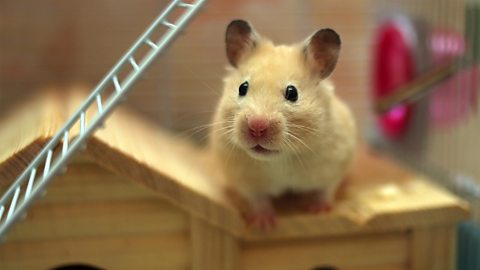
der Hamster - the hamster
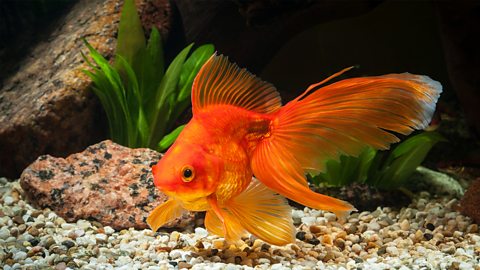
der Goldfisch - the goldfish

die Katze - the cat
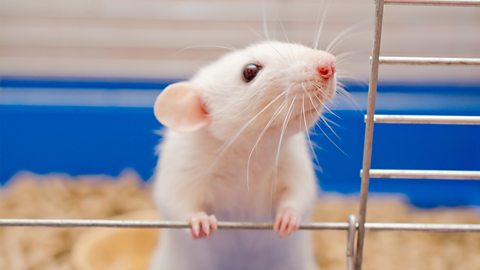
die Maus - the mouse
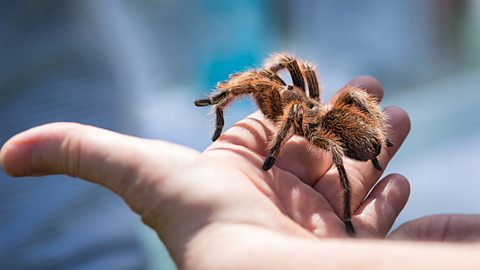
die Spinne - the spider
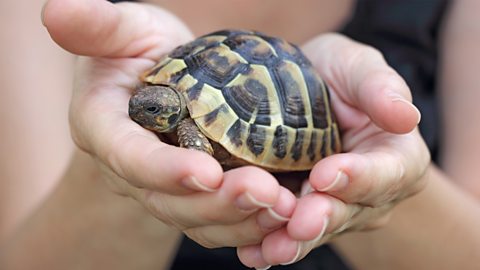
die Schildkröte - the tortoise
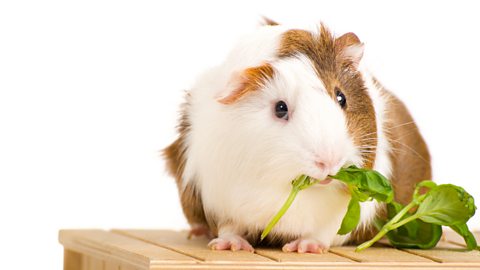
das Meerschweinchen - the guinea pig

das Kaninchen - the rabbit
Plural pets
But what if you have more than one pet? You can’t simply add an s on the end like in English. Plurals in German have different endings depending on the noun. Masculine and neuter nouns often add an e and feminine nouns often add an n .
- Ich habe zwei Hund e - I have two dog s .
- Ich habe drei Pferd e - I have three horse s .
- Er hat vier Katze n - He has four cat s .
- Sie hat acht Spinne n - She has eight spider s .
There are some exceptions to this rule:
- Ich habe zwei Kaninchen - I have two rabbits.
- Ich habe sieben Meerschweinchen - I have seven guinea pigs.
- Ich habe sechs Hamster - I have six hamster s .
Ich habe vier Mäuse - I have four mice .
Here are some plural pets:
Audio Transcript Audio Transcript
Find out how much you know about family and pets in German in this short quiz!
Game - FestiLingo: German
Visit the festival and practise German language skills in this game

More on Topics
Find out more by working through a topic
Describing people in German using 'haben' and 'sein'
- count 3 of 9
Days and months in German
- count 4 of 9
Telling the time in German
- count 5 of 9
Describing your free time in German
- count 6 of 9
Talk to our experts
1800-120-456-456
- My Family Essay

Essay on My Family
A family is God’s greatest gift to all living beings on earth including human beings. A person without family and its love is never complete and happy. A family is one with whom you can share all your joys and sorrows. Family stands by you at the toughest situations in life. Family gives you the warmth and affection that you may not get anywhere else. I too am blessed with such a family. My family has always been my strength. My mother, father, sister and I complete my family.
My Mother
My mother is the strongest woman I have ever seen in my life. She is a super woman. She can manage everything at the same time so beautifully and confidently. She is a fine individual with poise and dignity. She is the pivot around whom our family revolves. She has raised us with important values in life. She explained to us the true essence of love and compassion. She also tells us the importance of spirituality. She has given utmost importance to our education. She coordinates with our teachers in school and helps us with our weaknesses. My mother is an amazing cook and takes care of what we like to eat. She’s just not a housewife. She is an entrepreneur too. She owns a restaurant managing a staff of 30 boys. It is indeed not an easy job but she manages everything very efficiently. She is an inspiration to all of us. She is indispensable to our family.
My father is a man of strong principles. His presence at home itself gives us a sense of security and hope. He is very gentle, disciplined and strict. He is a software engineer by qualification and works for a multinational company. Since the headquarters of his company is in The United States of America, he frequently needs to travel. I know he feels very sorry that he is not able to spend much time with us due to work pressure and travel but whenever he is at home he makes the best of it. He has a good sense of humor. He makes us laugh with his jokes and keeps telling us about his work experience. I get a lot of insight from it and clarity of what field I can take when I grow up. I have learnt a most important and valuable lesson from him that is being content in life with whatever I have. The atmosphere in our home becomes so cheerful and joyful when he is around. It gives a feeling of a complete family. He is a dutiful son towards his mother. Even though my grandmother doesn’t live with us, my father carries all his duties and responsibilities for her very diligently. I feel proud to be his son. I want to grow like him and take care of my parents the way he does.
My sister is three years older than me. She is a very soft and gentle girl. She is my best friend and a confidant. We fight on silly things but I know she really cares for me and loves me a lot. She always protects me from getting scolded by my mother. She is an artist and helps me with all my drawings. My sister supports and stands by me when seniors in my school bully me. I feel very secure around her when I am away from my parents.
To Conclude
My family has taught me to be a better person. I am blessed and fortunate enough to have such a wonderful family who has taught me important values in life. I am very grateful and I thank God for the most precious gift.
The childrens who live with a mother and a father are known as a small discern family. A couple in which more than two children reside is referred to as a huge discern family. And a family in which mother, father and youngsters, besides grandparents, uncles and aunts, a circle of relatives stays together is referred to as a joint family . My family is a small joint family. Apart from siblings, mother and father, grandparents also stay with us. Our family plays a crucial role within the making of any development. With the increase in the circle of relatives, India climbs the ladder of improvement. The country is formed by way of its own family and global fashion with the aid of nations. This is why it's far stated, “Vasudhaiva Kutumbakam” means the entire world is our circle of relatives. And it had superb importance in ancient India, which is slowly becoming extinct with time. A primary purpose for this is the conversion of the joint family into the unique circle of relatives.
Significance of Family in My Lifestyle
My own family, despite being a joint own family, is a happy family. And I am glad that I was born in this joint circle of relatives. wherein it became simplest through our own family that we had been able to study the critical things of existence in our children which we could rarely analyze thru books. each of my parents ' paintings in faculty. At some point during my stay at home, my siblings and I spoke many topics with our grandparents, which is quite exciting. Other than this, we also have one of our dogs, who is a part of our circle of relatives.
Family as Safety Clause
A family provides safety from outside evils and risks, that is, the man or woman is protected from all varieties of outside failures within their own family, in addition to the physical, mental and highbrow improvement of a character is due to the circle of relatives. The circle of relatives creates a secure environment for the kid and all our expectations and wishes are met via the family. My circle of relatives is a middle-class family, still my mother and father try their best to fulfill each of mine and my siblings wishes. The love from the circle of relatives towards me takes me closer to my family and helps me recognize my obligations in the direction of my own family. A person additionally will become a responsible citizen of society by the habit of spitting out his responsibilities. Every family individual faces hassle collectively during their difficult time.
Importance of Elders Inside the Family
A joint family in which our elders (grandparents, grandparents) stay with us, is the most important thing to focus on as they are not part of the authentic circle of relatives so that kids are deprived of understanding many critical beliefs and values. In advance, children used to play on time and additionally concentrate on the tales of grandparents, which gave them information, however the kids of the prevailing time use mobile from their adolescence to play. The authentic family has additionally taken away the kid’s formative years.
What the child will become inside is the destiny that depends totally on the child’s own family. With the help of the proper steerage, even a susceptible baby kisses is a brand new dimension of achievement inside the future. On the contrary, a brilliant student forgets his intention due to wrong steering and is left at the back of inside the race of life.

FAQs on My Family Essay
1. How can you Define a Family?
A family is a group of people who are related and live together in every situation. Family normally comprises mother, father, sister, brother, grand parents, uncles and aunts.
2. Why is Family Important?
Family is important to us because it gives us the warmth, love and affection that you may not get anywhere in the world. Family teaches the high moral values in life and makes you a better human being.
3. How does your father inspire you?
My father inspires me with his hard work, honesty and diligence. He is very loving and caring and binds the entire family together.
4. Why should you thank god for giving a family?
I thank God and am very grateful for the most precious gift of family because family members give unconditional love, care and affection. I am what I am because of my family. My family completes me.

IMAGES
VIDEO
COMMENTS
Read our Complete Vocabulary: Talking about - The Family - in German. German Essays on My Family: Meine Familie Essay One: The Average Family. Meine Familie ist eine kleine Kernfamilie, die zu einer bürgerlichen Familie gehört. Meine Familie besteht aus vier Mitgliedern, einem Vater, einer Mutter, mir und einer kleinen Schwester.
First, you will find an example of a short essay in German. It shows you how you can describe your own family. Since every family is different, I wrote some more examples for you to choose from. After the German part follows a part in italics where I tell you in English what the German text is about. After the examples of short essays, you will ...
First, you will find an example of a short essay in German. It shows you how you can describe your own family. Since every family is different, I wrote some more examples for you to choose from. After the German part follows a part where I tell you in English what the German text is about. After the examples of short essays, you will find a ...
Learn German - My Family Essay in German | Meine Familie | German for BeginnersIn this video, there is an essay on My Family in German Language along with th...
Meine Familie: Free German Essays on Family Here is a new series of essays to support you with your homework at school. They are based on my experience working at schools in the UK. Part 1 covers the popular topic of describing your own family. Free German Essay on "My Best Friend" (Mein Bester Freund) Learning German? Struggling with German ...
Personal Narrative Essay : My Family Is My Life Persuasive Essay About My Family Reflective Essay About My Family Essay on My Family History Reflection on. Skip to document. University; High School ... First-Year German 1 (FLAN-12700) 6 Documents. Students shared 6 documents in this course. University Lewis University. Info More info. Academic ...
Improve your pronunciation and listening skills by listening to me reading the first essay on my family to you. You can find my original essay together with ...
Here the audio version to my German essay on my family on Hubpages. This is meant to help you with the pronunciation of the words in German and to improve yo...
It is easy to see the close Germanic language "family resemblance" between brother / Bruder , father / Vater, or daughter / Tochter. We call these similar words in two languages cognates. There are a lot of English-German cognates for the family. Others are familiar because of common Latin or French origins: family / Familie , uncle / Onkel, etc.
Tischchen from the word Tisch (table) Tässchen from the word Tasse (cup) 4. How to Talk about Family. It's quite easy to introduce your family to another person in German. Let's imagine ourselves sitting around a large table, where all the family is eating together, and a friend of yours arrives for the first time.
Kultur. Families in German-speaking countries tend to be small, with only one or two children (or no children). The birthrate in Austria, Germany, and Switzerland is lower than in many modern industrialized nations, with fewer births than deaths, i.e., less than zero population growth. Learning how to ask about or inquire about family in German ...
Learning or Practising German Language? or your tutor asked you to write about your family, or you can say you need to write an essay on My family…
The German word for family is " Familie " [faˈmiːli̯ə] and the plural is " Familien " [faˈmiːli̯ən]. Luckily it's very similar to the English word: Fah-me-lee-eh (/en). Slang words include " deine Alten " (your old ones) for someone's parents, but this expression has a negative connotation. So unless you're joking with ...
Use these four strategies to wow your teachers and write the perfect German essay. 1. Write down a list of words. You should look at any new activity as an opportunity to learn and master new vocabulary. Instead of using the same words that you use in your everyday German speech, use this essay as an opportunity to introduce new words into your ...
How to Say "Family" in German. The word for "family" in German is Familie and the plural is Familien . The word is pretty much synonymous, but just be sure to learn it as a singular word, not plural. Often in English, you'll hear people say "My family are " instead of "My family is. " This doesn't fly in German—so be sure ...
GCSE; Me Family members. It's important to express yourself clearly and in detail when you write in German. Find out how to give information about yourself and your family members, including why ...
Please watch: "Learn German | ONLINE GERMAN LANGUAGE COURSE | German Gyan - Nidhi Jain | A1 /A2 /B1|" https://www.youtube.com/watch?v=-sqIfNhVCJo --~--Hello ...
Describing your family. You can describe your family in more detail by saying their name, age and where they live. Use the verbs: heißen (to be called), sein (to be) and wohnen (to live). When ...
We are not born with values‚ but learn values from our families. All my values developed from my family ‚ and as I grew into an adult‚ I made them my own values. As a child‚ one is dependent on his or her family for emotional‚ physical‚ and mental support. The way a person values things is determined by one's upbringing.
Essay on My Family. The childrens who live with a mother and a father are known as a small discern family. A couple in which more than two children reside is referred to as a huge discern family. And a family in which mother, father and youngsters, besides grandparents, uncles and aunts, a circle of relatives stays together is referred to as a ...
Hello everyone,In this video will be learn how to talk about your family? and how to write some text on your family..🏠👪how to mention family members and si...